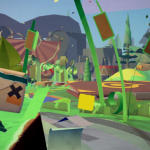When Games Matter is a weekly exploration by Drew Dixon of meaningful moments in games. Operating under the assumption that games do in fact matter, Drew seeks to highlight those moments that have much to say about who we are and the world we live in.
“An imagination is a terrible thing to waste.” That’s not a direct quote but I remember my mother saying something similar to me quite often growing up. My brother and I took this mantra to heart as we became proficient at creating fascinating worlds in which we were knights, ninjas, explorers, and heroes. As we get older and more aware of the world around us, we lose a bit of our childhood imagination, or at least we find it more difficult to tap into. Once we grow up, it seems we gravitate toward media that spells everything out for us and leaves little room for imagination. Perhaps this is why television, movies, and games seem to offer us a steady fare of hyper-realism.
Hyper-realistic stories, however, distort reality more than many abstract offerings. For instance a game like Call of Duty: Modern Warfare deceives its player. It possess a very realistic art style but its mechanics betray reality by making a game of war. That which would horrify us in real life is made to thrill us. By comparison, abstract media possesses a unique ability to speak truth into our lives because it does not abide by any particular view of reality and opens the door to profound feelings of surprise, fear, and amazement.
The appeal to such emotions is what makes Insanely Twisted Shadow Planet a fascinating experience. The beautiful side scrolling adventure game by Michael Gagne and Joel Olson refuses to spell out the contours of its world or even to explain to the player why he must traverse it. The game sets you in the cockpit of a flying saucer and simply asks to explore its world. You have a map on which a destination is marked telling you where you need to go. Getting there, however, is no simple task. Exploring the world and learning what tools you need to traverse it, drive the action. This would not be interesting if the world of ITSP were not compelling in and of itself. Thankfully, exploring the planet and coming in contact with its various mysterious life forms is fascinating. The world of ITSP is strange and wondrous and you are constantly discovering new creatures, locales, and tools that manipulate the environment. The lack of heavy-handed narrative explanation allows the player to be immersed in the simple task of discovery.
Sadly, too few games today tap into our imaginations. Instead games tend to tell us exactly who our character is and what we need to do. They present us with direct, manageable worlds. The result is a slew of rather predictable games. ITSP, however through its mysterious world, taps into the players imagination and in so doing evokes a sense of awe and wonder in the player. I no longer possess the vivid imagination I had as a child, but games like ITSP help me keep from losing it altogether.











